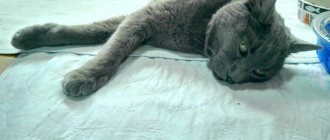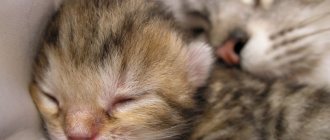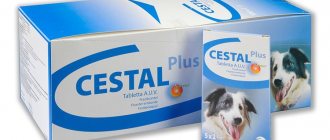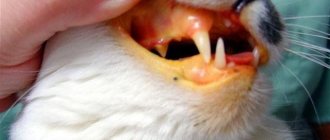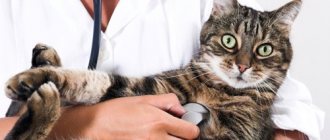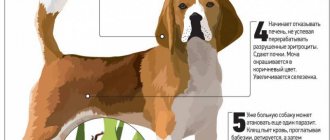Major liver diseases in dogs
Hepatitis.
This is a contagious viral disease. The main symptoms of the disease: liver dysfunction, fever, central nervous system damage, catarrhal inflammation of the mucous membrane, diarrhea and vomiting. There are vaccinations that prevent hepatitis.
Leptospirosis.
This infectious pathology can affect not only the liver, but also other organs. Rodents are often the carrier of infection. Among the main symptoms of the disease are loss of appetite, change in urine color, fever, and the appearance of small ulcers in the dog’s mouth. The treatment of leptospirosis is based on the use of potent antibacterial drugs.
Pancreatitis.
Inflammation of the canine pancreas can also affect liver function. The disease causes dehydration, loss of appetite, shortness of breath, etc. Treatment of pancreatitis is carried out by a doctor. In this case, the dog is prescribed a strict diet.
Non-infectious hepatopathy of various etiologies.
Hereditary liver diseases, the consequences of the use of certain drugs, poisoning and other pathologies of the organ can cause discomfort, pain and the appearance of new symptoms. A detailed examination may be necessary to treat them correctly.
Cirrhosis.
Incurable disease, degeneration of liver tissue. Such liver damage often manifests itself as one of the consequences of hepatopathy and poisoning. Possible symptoms of the disease: changes in the shape of the abdomen, loss of appetite, weakness, ascites and others.
Dosage and method of administration
The drug is intended for internal use. Some time before use, the product must be prepared - shake thoroughly, stirring for several minutes, until smooth.
For the convenience of animal owners, the box with the medicinal product contains a dosing syringe, which is used to measure the norm recommended by the manufacturer.
The Hepatovet instructions for dogs indicate the following dosages, depending on the pet’s initial weight:
- For puppies or small breed dogs, up to 10 kg - 3 ml/day.
- For small dogs, 11-20 kg - 6 ml/day.
- Medium sizes, 21-30 kg - 9 ml/day.
- Large breeds, 31-40 kg - 12 ml/day.
The course of treatment lasts an average of one and a half months.
If you miss a medication, no measures need to be taken; increasing the dosage of subsequent doses is also not recommended.
AVZ preparations for the treatment of liver in dogs
- Hepasafe plus suspension for dogs.
This medicine is prescribed as part of therapy for the prevention and treatment of various liver diseases. "Hepasafe Plus" helps relieve intoxication and also has antioxidant and regenerating properties. Unlike a tablet, the suspension form allows you to easily calculate the dosage for any breed of dog.Advantages of the Gepasafe Plus suspension:
- promotes restoration and regeneration of liver cells;
- contains only natural ingredients as active ingredients;
- reduces the concentration of cholesterol in the blood;
- compatible with medicines, feed and feed additives.
has a protective effect against intoxication and poisoning;
The drug is prescribed both for complex treatment and for the prevention of acute and chronic liver diseases in cats and dogs. The drug is administered intramuscularly using a syringe.
Advantages of Solution for injections "Gepasafe":
- protects liver cells during toxic lesions;
reduces the negative effects of chemotherapeutic agents;
The use of hepatoprotectors must be agreed with a specialist. This way you can avoid negative consequences for your pet and eradicate the very cause of the disease.
Order medications for the treatment of liver in dogs on the AVZ website. You can rely on the quality of our products, the affordability of medications will please you, and a wide range of products will allow you to choose what your pet needs.
Contraindications and side symptoms
The instructions for Hepatovet for dogs have a small list of restrictions for use, since the drug is safe. The hepatoprotector should not be used if the animal has epilepsy or encephalopathy.
Pregnancy and the period of feeding offspring are not contraindications for use.
It is extremely rare for pet owners to notice increased salivation in animals when taking Hepatovet for dogs. This is not dangerous.
There is a possibility of developing allergic reactions to certain components of the medication.
In the event of a sudden urge to vomit after taking Hepatovet, the animal must be shown to a veterinarian as soon as possible.
If you strictly adhere to the Hepatovet instructions for dogs, this will increase the chances of effective treatment and reduce the risk of side symptoms.
Hepatovet is well compatible with other medications, which is why it is often prescribed in complex therapy.
Properties of the drug
The drug has a complex effect and has the following properties:
improves liver condition;- restores and preserves cell structure;
- normalizes the amount of ammonia in the body;
- performs a transport function;
- reduces cholesterol concentration;
- eliminates flatulence and colic.
Under its influence, the liver begins to function fully, and toxins are removed from the body.
Owner reviews
Tinka: “My toy terrier has not complained about his liver for 3 years. However, after a year on the therapeutic diet, problems began. After a course of injections and hepatoprotectors, they went away, but exacerbations occur periodically. Then we save ourselves with Hepatovet: it does an excellent job, no other medications are needed.”
Dmitry: “The dog has white spots on its nose. In addition, diarrhea was observed for 2-3 months, the pet sometimes refused to eat, and there was a smell from the mouth. We took a blood test - increased bilirubin! An ultrasound showed an enlarged liver. Hepatovet was prescribed: he took it out of a syringe without a needle - the included dispenser was inconvenient. After 2 weeks, bilirubin decreased, although it was still above normal. Now we feed a bottle every 3 months. The dog is feeling better: he eats willingly, the light spots on the pug have disappeared.”
Maria: “Bagirka lost her appetite, she stopped playing, and slept constantly. We went to the vet and found out there were serious problems with the liver. The doctor prescribed only Hepatovet. I was skeptical about the drug because of the low price. But after a month the indicators leveled off, the dog began to eat willingly again and became active. The medicine is good, but without prescribing a specialist and taking tests, I would not give it.”
Advantages and disadvantages of the drug
Advantages of the drug:
- Low cost relative to other hepatoprotectors.
- Convenient packaging with a measuring syringe.
- Natural composition.
- Treatment effectiveness.
Flaws:
- When using the medicine, cats may experience increased salivation.
- The odor of the suspension is unpleasant to humans.
- It has the following contraindications: liver failure, hepatic encephalopathy, epilepsy, individual intolerance to the components.
- There are rare side effects such as vomiting, nausea or allergies.
Release form and composition
Hepatovet for dogs is the brainchild of a well-known pharmacological veterinary company (until 2021 it was called “Api-San”). This is a hepatoprotector - a dietary supplement to maintain liver health.
Hepatovet is not a medicinal product. Therefore, it is sold without a prescription in any veterinary pharmacy and pet store. But before use, be sure to consult your veterinarian.
The drug is available in 2 forms: regular - Hepatovet and modernized - Hepatovet Active. Their composition is similar except for a couple of points.
| Active substance | Regular form | Assets |
| Essential phospholipids | 60 mg/1 ml | Not listed in the instructions for use. |
| Methionine | 100 mg/1 ml | 100 mg/1 ml |
| L-ornithine | 50 mg/1 ml | 50 mg/1 ml |
| Milk thistle squeeze | 15 mg/1 ml | 30 mg/1 ml |
| Immortelle extract | 15 mg/1 ml | 15 mg/1 ml |
Also, the releasing forms differ in their auxiliary components. Key difference: Hepatovet Active contains Bacon flavoring.
Hepatoprotectors from Apicenna are cheap. So, an ordinary Hepatovet costs on average 375 rubles. for a 50 ml bottle and 600 rub. for 100 ml, Active – 420 rub. for 50 ml and 630 rub. for 100 ml.
Indications for use
Hepatovet is used as an independent medicine and together with other drugs, prescribed during treatment and after illness to restore liver cells:
- Chronic and acute liver pathologies: hepatitis, lipidosis, hepatosis, cirrhosis.
- Viral, fungal, bacterial infections. Diseases are accompanied by intoxication due to the proliferation of pathogens and side effects of drugs.
- Long-term treatment with antibiotics and other drugs that have a destructive effect on the liver.
- Chemotherapy . Potent drugs destroy both diseased cells and healthy ones.
- Food, medicinal, chemical poisoning . When neutralizing toxins, the liver is subjected to serious stress, and the organ requires support.
- Helminthiasis, infection with subcutaneous mites . The waste products of parasites cause intoxication and weaken the liver.
Hepatovet is used as an additional remedy for the recovery of cats after eating disorders.
Dosage and method of administration
The medicine is added to the food, if the cat refuses to eat, it is poured into the mouth through a dispenser syringe:
- Shake the bottle for a minute.
- The required amount of suspension is collected using a dispenser.
- The tip of the syringe is inserted into the free space between the teeth from the edge of the jaw, closer to the root of the tongue.
- The suspension is injected and the mouth is kept closed.
- They wait for the cat to make a swallowing movement and release it.
Hepatovet is given 2–3 times a day at equal time intervals.
A single dose depends on body weight:
| Reparin-Helper for the treatment of cats First aid kit for cats Deworming tablets for cats, which ones are better? Cat weight, kg | Single dose, ml | Daily dose, ml |
| until 3 | 1 | 2-3 |
| 3-6 | 2 | 4-6 |
| 7+ | 3 | 6-9 |
The average duration of one course is 3 – 5 weeks, more precisely determined by a veterinarian. If a dose of the suspension is accidentally missed, treatment is resumed according to the previous regimen, the dose is not increased. A repeat course is prescribed after 2 - 3 weeks.
Pharmacological properties
The liver is involved in metabolism and hematopoiesis, secretes enzymes to break down food, and neutralizes decay products and toxins. 80% of it consists of hepatocytes; if they are damaged, the organ stops functioning normally.
Hepatovet is part of the pharmacological group of hepatoprotectors, drugs to support liver health:
- Phospholipids restore the structure of damaged hepatocytes and strengthen cell membranes. They stop the development of fibrosis, stimulate the secretion of enzymes, and prevent the degeneration of hepatocytes into adipose tissue.
- Methionine has antioxidant properties, increases the content of phospholipids, prevents the deposition and cleanses excess fats in the liver and blood vessels, and enhances the beneficial effects of vitamins and enzymes.
- L-ornithine accelerates the regeneration of hepatocytes, reduces the concentration of ammonia, and stabilizes the balance of alkali and acid.
- Milk thistle contains flavonoids that prevent oxidation and enhance the protective properties of cells, relieve inflammation, and accelerate the elimination of toxins.
- Immortelle reduces the viscosity of bile, stimulates its outflow and prevents stagnation, reduces spasms, pain, and colic.
Hepatovet restores liver function, which has a beneficial effect on health and well-being.
Side effects, overdose
Hepatovet belongs to the group of low-hazard substances; negative consequences after it are rarely noticed. In some cats, saliva production increases a quarter of an hour after administration. This phenomenon disappears spontaneously after 5 – 7 minutes. In isolated cases, vomiting begins. The cat is given antiemetics and the dosage is checked with the veterinarian.
Hypersensitive cats develop spots and irritations on the skin. The suspension is canceled if signs of allergy remain after 24 hours, and antihistamines are prescribed. Then consult a doctor about changing the drug. The instructions do not report signs of overdose, because such cases have not been identified.
Contraindications, use for pregnant cats
Hepatovet should not be prescribed for the following pathologies:
- severe liver failure;
- hepatic encephalopathy;
- epilepsy;
- intolerance to components.
The suspension can be given to kittens, pregnant females, and elderly cats.
Drug interactions
Hepatovet can be safely combined with veterinary drugs:
- antibiotics;
- pacemakers;
- diuretics;
- anthelmintic;
- fungicides;
- analgesics;
- antihistamines;
- immunomodulators.
The drug is combined with food additives, vitamins, industrial and natural food.
Storage conditions
Hepatovet is kept at a temperature of plus 2 - 25℃ in a dry place, not placed in direct sunlight, and not used after the expiration date. In unopened packaging, the medicine is stored for 2 years, an opened bottle is used for 3 weeks, after which time it is thrown away.
The drug is not stored near food and feed, and is not left within reach of children and pets.
Analogs
In veterinary pharmacology there are no drugs absolutely identical to Hepatovet, but there are drugs with similar therapeutic effects.
They include only its individual components:
- Hepatoject is available in the form of injections, the active ingredients are the amino acids L-citrulline, L-arginine, L-ornithine. The course of treatment is reduced to 5–7 days, but the injections are painful.
- Karsil - tablets based on milk thistle fruit extract. The medicine stimulates the formation of estrogen, so it is given carefully to cats with problems with the mammary glands and uterus. The tablet is bitter and causes severe salivation, so it is not crushed, but placed entirely on the root of the tongue. Improvements appear after 3 months of use.
- Hepatolux is a suspension that is similar in composition, method and duration of application to Hepatovet. It also contains lecithin, methionine, milk thistle, and other active ingredients: royal jelly of bees, amino acid L-arginine, glycine, artichoke leaf extract.
- Legafiton 50 is available in tablet form, the medicinal components are milk thistle and orthosiphon extract, L-ornithine. The medicine has a diuretic effect and is not recommended for use in renal failure.
- Covertal is an injection solution that contains extracts of medicinal plants in homeopathic doses: dandelion, speedwell, milk thistle, celandine, moss.
- Heptral is a human medicine in the form of tablets and powder with liquid for preparing a solution for injections; it contains one component - ademetionine. Heptral is allowed to treat cats with serious disorders of the gallbladder and liver function, but only a doctor determines the dose and treatment regimen.
Hepatovet is a safe, inexpensive veterinary drug; it has no identical substitutes; the price ranges from 260 to 360 rubles.
Cat owners notice an improvement in the well-being of their pets; reviews often mention the following positive changes:
- cats become more active and energetic;
- appetite returns;
- the abdomen in the liver area decreases;
- biochemical blood test indicators return to normal;
- the condition of the coat improves;
- nausea, vomiting, flatulence after improper feeding, and indigestion stop;
- older cats over 15 years old digest food better.
Veterinarians have a positive attitude towards Hepatovet, but some doctors doubt the therapeutic effect, therefore they consider it not a drug, but a useful dietary supplement to food.
Features of use for the treatment of pregnant, lactating cats and kittens
The manufacturer of Hepatovet does not indicate that it is dangerous for kittens, pregnant and lactating cats. This means that the medicine can be used to treat them. Since the instructions do not indicate that there are any special admission conditions for pets from this category, they must be treated according to the standard regimen.
The product can have a qualitative effect on the body:
- Restore liver cells.
- Support liver function during the process of eliminating various toxins.
- Reduce the amount of ammonia compounds inside the body.
- Promote the process of activating the enzyme system.
- Reduce fibrous degeneration of some tissues.
- Influence the antioxidant process.
- Eliminate all pain, colic and flatulence in the pet’s body.
Essential phospholipids act during absolutely any liver deformation. Such cell elements successfully restore water and fat metabolism in the body, protect the organ from fatty degeneration, and restore all the cells that are in the liver. During the work of phospholipids, the process of increasing the number of glycogen throughout the body occurs and the process of protein metabolism is normalized.
L-ornithine takes an active part in the process of regeneration of body tissues, as well as the removal of ammonia components; Insulin production increases and the optimal acid-base balance is restored.
Methionine is considered a pronounced detoxifier, which acts as an essential amino acid. Involves the process of the enzymatic and hormonal systems in the body. Significantly increases the amount of phospholipids and reduces the amount of cholesterol.
Milk thistle (herb extract) contains high-quality anti-inflammatory and choleretic properties. Quite a strong antioxidant, improves the structure of cells inside the liver, and has a general strengthening effect on the body.
Immortelle plant extract significantly reduces pain symptoms, eliminates spasmodic actions, vomiting, and flatulence. Also, along with this, the components of the herb have a positive effect on bile secretion, the viscosity consistency inside the bile decreases.
This medicine should be prescribed as a whole with other medications or separately:
- During any disturbance in the functioning of the liver in a chronic, as well as particularly acute form.
- After suffering severe poisoning.
- During and after the end of infectious diseases that occur with severe intoxication of the entire body.
- During, as well as after the end of the course of using a drug with high hepatotoxicity, long-term chemotherapy treatment.
- During the recovery of the animal’s body after helminthic infestation.
- Restoration of the liver after the end of a long period of improper feeding of the pet.
Instructions for use
Before using the medicine, you should try to calm the cat. Many pets, due to the specific smell of the suspension, do not mind trying it on their own. If you refuse to accept, the animal must be secured.
- Shake the bottle well before use. The suspension should be homogeneous, without sediment at the bottom.
- The medicine is given orally.
- The required amount of suspension is taken into a measuring syringe and poured into the cat’s cheek area, or onto the root of the tongue. You can mix the drug into wet food, but you need to make sure that the entire amount is consumed by the animal.
Dosage and duration of use
- For kittens and adult animals weighing up to 3 kg, a single dose is 1 ml. You can give no more than 3 ml per day.
- Animals from 3 to 6 kg receive 2 ml of the drug once. Per day – 6 ml.
- Cats over 6 kg are given 3 ml of suspension, about 7-9 ml per day.
The daily dose is divided into 2-3 doses per day, trying to maintain approximately the same period of time between doses.
The duration of treatment is determined by the veterinarian. Usually it lasts 1-2 months. The shortest duration of therapy is 3 weeks.
If necessary, courses are repeated after 15-20 days. Whether the pet will need to re-use Hepatovet or not should be determined by the veterinarian. Perhaps he will replace this medicine with another.
Video on how to give a cat a slurry:
How to store the medicine
The medication is stored in a dry place, protected from sunlight. The bottle of medicine should be kept away from household chemicals, food and feed.
The optimal temperature is considered to be +2…25 °C. It is important that the storage space is inaccessible to animals and children.
Deadlines
A closed bottle is good for two years from the date of issue. Once opened, the medicine is stored for a maximum of 21 days, after which it cannot be used.
Disposal
After the expiration date, the medicine and the bottle are disposed of along with household waste.
There is no need to take special precautions. The use of containers for storing food is strictly prohibited.

